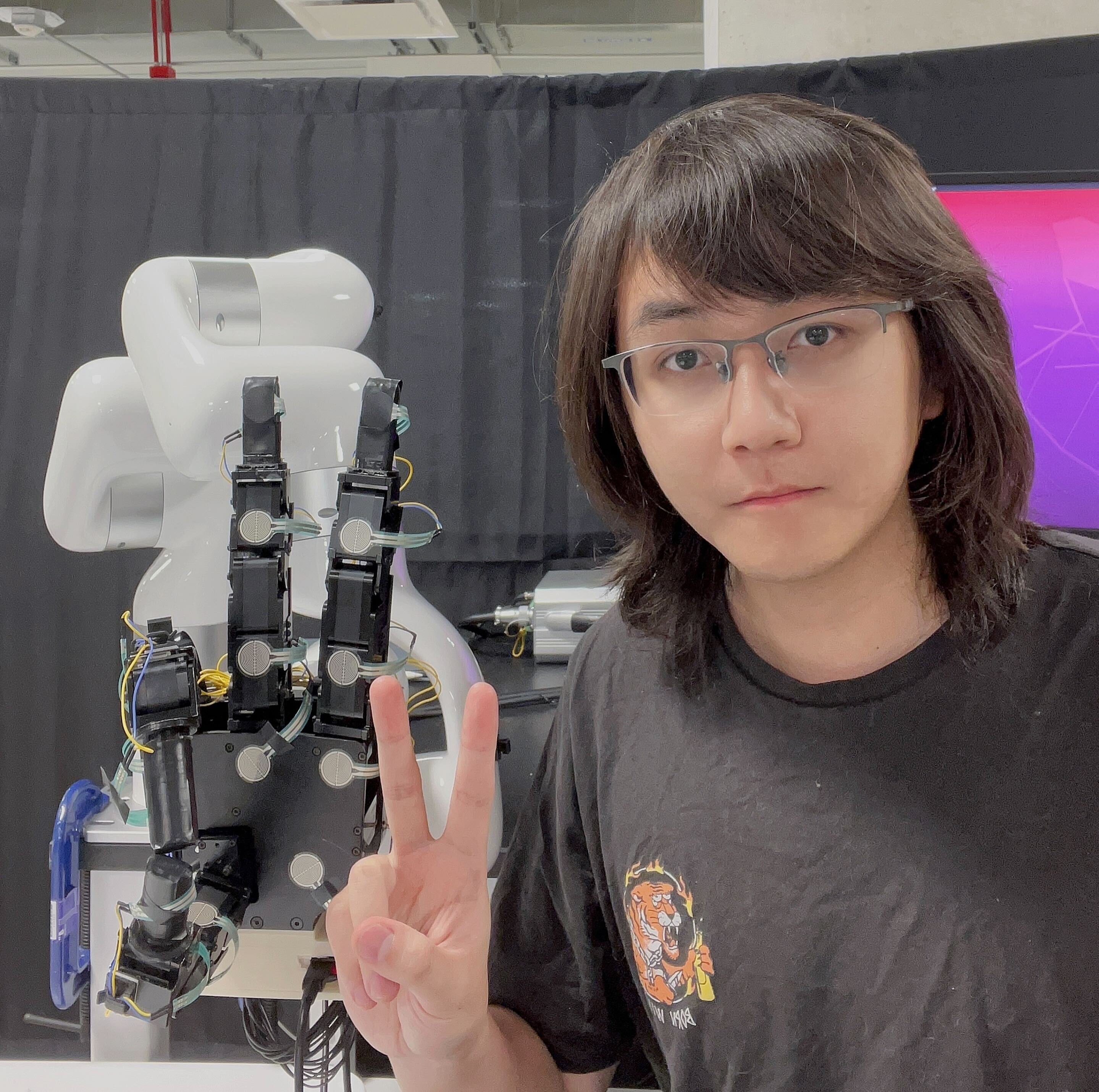Introduction
Fine manipulation involves making precise movements with robotic hands and fingers to handle small objects or perform intricate tasks, such as threading a needle. Dexterous manipulation goes further, requiring highly skilled, accurate, and versatile manipulation of objects through complex interactions among multiple fingers and joints. The ability to achieve fine and dexterous manipulation with high speed, accuracy, and dexterity is becoming increasingly important in robotics research. However, it also poses many challenges, such as frequent making and breaking of contact, real-time feedback control with high-dimensional observations, high-dimensional control spaces, and objects being in unstable configurations. Traditional methods rely on precise robot and environment models but often struggle with real-world uncertainties and lack generalizability. Despite decades of research, most demonstrations of dexterous manipulation still rely heavily on teleoperation. Achieving robust and generalizable dexterous manipulation requires advancements in perception integration, data collection, and control. Advances in robot learning, including machine learning and transfer learning, offer promising pathways to enhance robotic performance in fine and dexterous manipulation tasks. This event seeks to convene researchers from diverse disciplines to share insights on pushing this critical boundary.
This workshop aims to bring together junior and senior researchers to discuss the latest advancements, challenges, and future directions in learning-based approaches for robot fine manipulation skills, one of the most challenging areas in robotics. We will delve into the current state-of-the-art across relevant areas, including the hardware and mechanical design of dexterous manipulators, generalizable skill learning techniques, and sensing modalities such as tactile sensors and vision systems. Researchers will have opportunities to present posters, give contributed talks, and engage in thought-provoking discussions.
We will explore the following focused research questions:
Synergy between Learning and Control- What’s the right balance between model-free learning and control-theoretic methods? Should we pursue hybrid approaches that combine the strengths of both?
- How can we reduce reliance on simulation while improving the transferability of policies to the real world?
- How can we extract meaningful visual information in the presence of occlusions caused by hands or tools?
- What strategies ensure robust policy generalization across varied lighting, cluttered environments, and unseen objects?
- Can tactile sensing match or surpass visual input in certain tasks? What types of tactile sensors are most effective, and how can we maximize their integration into manipulation pipelines?
- What innovations can lead to more compact, efficient, and capable robotic hands?
- How can we enhance durability and reduce the maintenance costs of dexterous hardware?
- Will a single foundation model for dexterous manipulation emerge, or will specialized models for specific tasks dominate?
- How can we develop policies that handle dynamic, forceful, or high-speed interactions effectively?
- Can we standardize the collection and use of human hand data to train and evaluate robotic manipulation skills?
- How can we build generalizable policies from limited or biased demonstration datasets?
- What are the key strategies for scaling reinforcement learning pipelines to handle hundreds of tasks without requiring extensive manual tuning?
Invited Speakers
Call for Papers/Demos
In this workshop, our goal is to bring together researchers from various fields of robotics, such as control, optimization, learning, planning, sensing, hardware, etc., who work on dexterous manipulation. We encourage researchers to submit work in the following areas (the list is not exhaustive):
- In-hand manipulation, dexterous manipulation, fine manipulation
- Learning robot fine-manipulation skills
- Reinforcement learning in robotic fine-manipulation
- Transfer learning in robotic fine-manipulation
- Imitation learning/Learning from demonstration of fine-manipulation skills
- Data collection for fine and/or dexterous manipulation
- Simulation for fine and/or dexterous manipulation (sim2real approaches)
- Investigating planning strategies and algorithms for dexterous manipulation tasks
- Integrating tactile sensing for enhanced manipulation and multi-modal learning
- Welcoming submissions on any additional topics related to learning-based dexterous manipulation not covered above 😄
Submission Guidelines
- Submission Portal for Paper and Demo: OpenReview
- Paper Submission Guideline:
- Paper Length: Submissions should be 4-page maximum short papers, excluding references, acknowledgements, and appendices.
- Format:
- The format requirement follows the CoRL 2024 main conference. Paper template: Link. Please make sure your submission is anonymous.
- Please include the references and appendix in the same PDF as the main paper and submit optional videos as zip file in supplementary.
- The maximum file size is 100MB. More information on format can be found here.
-
Review Process:
- All submissions will undergo a peer-review process and will be evaluated based on their relevance and contribution to the workshop’s topics.
- Accepted submissions will be featured at the workshop through Poster Spotlight Talks (3-minute presentations) and Poster Sessions.
- Dual Submission for Other Conference:
- Papers to be submitted or in preparation for submission to other major venues in the field are allowed.
- We also welcome published works as long as explicitly stated at the time of submission.
- Note: CoRL 2025 discourages full papers to also be submitted as Workshop Contributions
- Visibility: Submissions and reviews will not be public. Only accepted papers will be made public.
- Awards: Cash prizes will be sponsored by Dexmate, along with free robotic hands provided by LEAP Hand.
Timeline
Openreview Here- Submission Deadline:
August 20, 2025August 27, 2025 (PT) - Notification: September 13, 2025
- Workshop Date: September 27, 2025
Workshop Schedule
| Time (UTC+9, Korean Standard Time) | Event |
|---|---|
| 09:25 - 09:35 | Workshop Introduction |
| 09:35 - 10:00 | He Wang |
| 10:00 - 10:30 | Spotlight Talks 1 |
| 10:30 - 11:00 | Poster / Demo Session |
| 11:00 - 11:30 | Tess Hellebrekers |
| 11:30 - 12:00 | Lucas Manuelli |
| 12:00 - 12:30 | Nathan Lepora |
| 12:30 - 13:30 | Lunch Break |
| 13:30 - 14:30 | Panel with Speakers |
| 14:30 - 15:00 | Spotlight Talks 2 |
| 15:00 - 15:30 | Poster / Demo Session |
| 15:30 - 16:00 | Jitendra Malik |
| 16:00 - 16:25 | Beomjoon Kim |
| 16:25 - 16:30 | Closing Remark & Award |
Spotlight Talk Schedule:
Spotlight presenters have 3 minutes for their talk. Please check your email for the link to upload your slides.You may also display your poster during your assigned morning or afternoon session.
Morning
- Suction Leap-Hand: Suction Cups on a Multi-fingered Hand Enables Embodied Dexterity and In-Hand Teleoperation
- EquiContact: A Hierarchical SE(3) Vision-to-Force Equivariant Policy for Spatially Generalizable Contact-rich Tasks
- HERMES: Human-to-Robot Embodied Learning from Multi-Source Motion Data for Mobile Dexterous Manipulation
- ViTacFormer: Learning Cross-Modal Representation for Visuo-Tactile Dexterous Manipulation
- Latent Action Diffusion for Cross-Embodiment Manipulation
- FunGrasp: Functional Grasping for Diverse Dexterous Hands
- mimic-one: a Scalable Model Recipe for General Purpose Robot Dexterity
- TacDexGrasp: Compliant and Robust Dexterous Grasping with QP and Tactile Feedback
Afternoon
- FLASH: Flow-Based Language-Annotated Grasp Synthesis for Dexterous Hands
- Vision-Free Object 6D Pose Estimation for In-Hand Manipulation via Multi-Modal Haptic Attention
- Tactile Memory with Soft Robot: Tactile Retrieval-based Contact-rich Manipulation with a Soft Wrist
- Scaling Cross-Embodiment World Models for Dexterous Manipulation
- DexUMI: Using Human Hand as the Universal Manipulation Interface for Dexterous Manipulation
- Zero-shot Sim2Real Transfer for Magnet-Based Tactile Sensor on Insertion Tasks
- DexSkin: High-Coverage Conformable Robotic Skin for Learning Contact-Rich Manipulation
- Way-Tu: A Framework for Tool Selection and Manipulation Using Waypoint Representations













